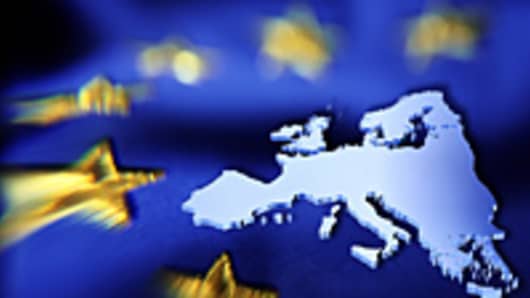Ever wondered why European politicians appear so calm when attending summits in Brussels or G8 meetings despite all the talk of a “Grexit” and economic Armageddon? They could be trying to show their confidence in their own ability to solve the crisis and avoid unnecessary panic. Maybe they really are confident that a solution is just around the corner and simply reflecting this confidence.
Or maybe this crisis was always part of the plan, and without it the great European project can never be finished.
"On 1 January 1999, with the introduction of the euro ...an important part of national sovereignty, to wit monetary sovereignty, was passed over to a European institution...The introduction of a common currency is not primarily an economic, but rather a sovereign and thus eminently political act...political union must be our lodestar from now on: it is the logical follow-on from Economic and Monetary Union,” then German foreign minister Joschka Fischer told European Union lawmakers just days after the introduction of the euro in 1999.
Fischer was not alone, with many of the founding members of the euro zone making it clear that the single currency was significant as a stepping stone to political union.
"The single currency is the greatest abandonment of sovereignty since the foundation of the European Community...it is a decision of an essentially political nature. We need this United Europe...we must never forget that the euro is an instrument for this project” said Felipe Gonzalez, then Spanish prime minister.
Even those who opposed the idea and refused to join agreed that the euro had little to do with economics.
"A single currency is about the politics of Europe. It is about a Federal Europeby the back door,” John Major, the former U.K. prime minister, said two years before the euro was born and six months before being routed at the polls by Tony Blair.
Historian Niall Ferguson wrote in this weekend’s Sunday Times that the euro’s founding fathers were well aware that the introduction of the euro would lead us to a crisis very like this one.
The skeptics had warned that the inability of member states to devalue the currency would lead to a competitiveness crisis which would be made worse by an inflexible labor marketthat would not, for example, allow Spanish workers to move to Germany in order to meet demand. Inappropriate borrowing costs for some member states were also seen as a key problem, fueling boom-and-bust borrowing binges — the same kind that ultimately got nations like Greece into this trouble.
In the first decade of the new century, despite dire warnings of trouble ahead, nearly every euro zone member borrowed more than was allowed under the EU’s stability and growth pact. Supposedly aimed at keeping government borrowingbelow 3 percent of gross domestic product , the pact was widely ignored, with even France and Germany failing to adhere to its terms. Even if the terms had been kept, they simply made it possible for governments to spend more than they earned by 3 percent, year after year.
This policy kept politicians in power and helped drive a period of economic prosperity that resembled a really good party that no one wanted to leave. When the financial system imploded in the U.S. and then Europe, the party was over and the hangover was bad — really bad.
Not everyone had the same kind of hangover, but collectively things looked pretty awful, with empty bottles everywhere and a number of ashtrays thrown across the floor. Greece, having started drinking before the party even began, woke up in the garden wondering what it had done with its clothes. Germany, having been careful about how much it drank, woke up in bed and started talking very loudly about the evils of alcohol and a need to show restraint.
Machiavelli himself would have been proud of the euro’s founding fathers. They pushed through a policy against considerable opposition aimed at achieving a result that was not about economic union. Given Europe’s inability to get ahead of the debt crisis, it could need someone with Machiavelli’s talent for high politics to achieve the ultimate aim: political union. Maybe German Chancellor Angela Merkel has someone in mind and is confident all will work out as a result.
—By CNBC EMEA's Head of News, Patrick Allen



